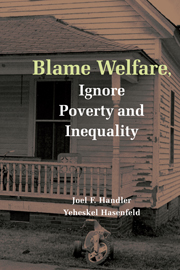Book contents
- Frontmatter
- Contents
- Acknowledgments
- List of Acronyms
- 1 Introduction
- 2 The State of Poverty: TANF Recipients
- 3 The Response to Poverty and Inequality: The Welfare State
- 4 Demonizing the Single-Mother Family: The Path to Welfare Reform
- 5 The Welfare Bureaucracy
- 6 Work and the Low-Wage Labor Market: Mothers and Children
- 7 Welfare Reform and Moral Entrepreneurship: Promoting Marriage and Responsible Parenthood and Preventing Teenage Pregnancy
- 8 Addressing Poverty and Inequality
- References
- Author Index
- Subject Index
3 - The Response to Poverty and Inequality: The Welfare State
Published online by Cambridge University Press: 20 August 2009
- Frontmatter
- Contents
- Acknowledgments
- List of Acronyms
- 1 Introduction
- 2 The State of Poverty: TANF Recipients
- 3 The Response to Poverty and Inequality: The Welfare State
- 4 Demonizing the Single-Mother Family: The Path to Welfare Reform
- 5 The Welfare Bureaucracy
- 6 Work and the Low-Wage Labor Market: Mothers and Children
- 7 Welfare Reform and Moral Entrepreneurship: Promoting Marriage and Responsible Parenthood and Preventing Teenage Pregnancy
- 8 Addressing Poverty and Inequality
- References
- Author Index
- Subject Index
Summary
Introduction
This chapter is divided into two parts. The first part provides an overview of the U.S. welfare state. In view of the nature and extent of poverty as discussed in Chapter 2, what has been the response? How has the U.S. welfare state addressed these problems? Who receives assistance and in what form? How secure is the safety net? As discussed, with very few exceptions, the basic approach of U.S. antipoverty policy is to focus on individual behavior rather than the structural conditions that cause poverty. Individual behavior, in turn, is primarily an issue of the work ethic. The work ethic has both objective (e.g., earnings) and moral components. Those who earn a living in the paid labor market fulfill social expectations – they “play by the rules.” Those who fail to earn a living through paid work and become needy are morally suspect. Why are they not working and supporting themselves and their families?
The distinction is cast in terms of the “deserving” and the “undeserving.” In general, the deserving are those who have worked in the paid labor market and are now excused from the paid labor market. The clearest example is the retired elderly who have worked a sufficient period of time in covered employment and made their contributions to Social Security. Today, most regular (“on the books”) paid employment is covered by Social Security. Cash assistance does not threaten the work ethic. Widows, widowers, and their children are included. Social Security is called a “pension.”
- Type
- Chapter
- Information
- Blame Welfare, Ignore Poverty and Inequality , pp. 70 - 149Publisher: Cambridge University PressPrint publication year: 2006



